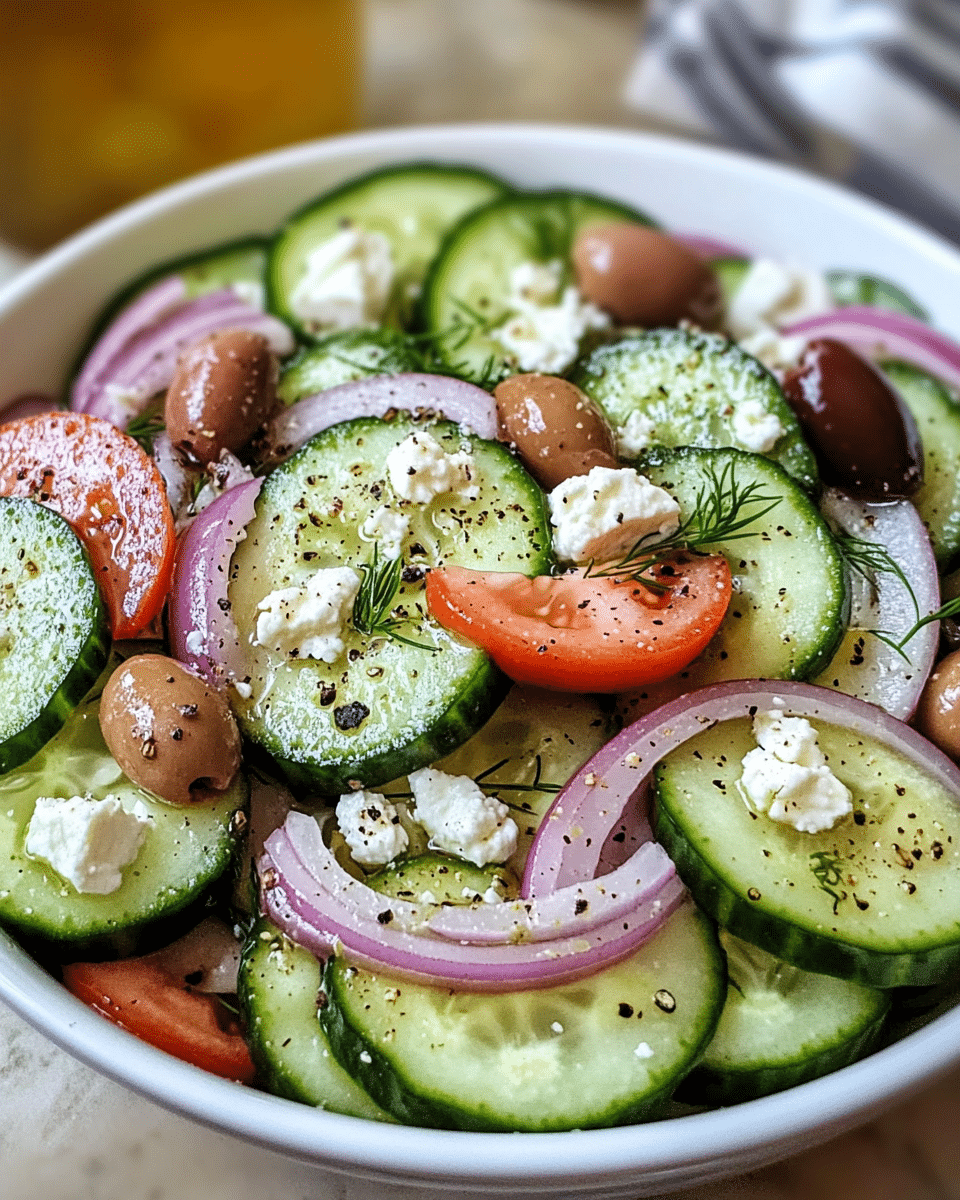This Greek Cucumber Salad is a crisp and invigorating side dish that beautifully blends traditional Mediterranean ingredients. The cool crunch of cucumber pairs seamlessly with the tang of red onion, creamy feta, and fragrant herbs like dill and parsley. Finished with a drizzle of olive oil and vinegar, every bite is a reminder that simplicity can be absolutely delicious.
Perfect for hot summer days, potlucks, or as a refreshing counterbalance to grilled meats, this salad requires no cooking and comes together in just minutes. It’s not only colorful and visually appealing but also full of bold, fresh flavors that can elevate any meal. Whether you’re planning a laid-back dinner or a Mediterranean-inspired feast, this dish belongs on the table.
Full Recipe:
Ingredients:
-
2 large cucumbers, thinly sliced
-
1/4 red onion, thinly sliced
-
1/2 cup crumbled feta cheese
-
1/4 cup fresh dill, chopped
-
1/4 cup fresh parsley, chopped
-
1/4 cup extra virgin olive oil
-
2 tablespoons red wine vinegar
-
1/2 teaspoon dried oregano
-
Salt and black pepper to taste
-
Optional: 1/4 cup sliced Kalamata olives
Directions:
-
In a large bowl, combine the thinly sliced cucumbers and red onion.
-
Add the crumbled feta, fresh dill, parsley, and olives (if using).
-
In a small bowl, whisk together the olive oil, red wine vinegar, oregano, salt, and black pepper.
-
Pour the dressing over the cucumber mixture and toss gently to combine.
-
Chill in the fridge for at least 15 minutes to let the flavors meld.
-
Serve cold as a refreshing side dish or light appetizer.
Prep Time: 10 minutes | Cooking Time: 0 minutes | Total Time: 10 minutes
Kcal: 150 kcal | Servings: 4 servings
Discover the Fresh and Flavorful Greek Cucumber Salad: A Mediterranean Classic
The Greek Cucumber Salad is a refreshing, light, and incredibly flavorful dish that celebrates the simplicity of fresh ingredients. Rooted in the heart of Mediterranean cuisine, this salad is a staple during the hot summer months across Greece, enjoyed as both a side dish and a light meal on its own. With its crisp cucumbers, tangy red onions, salty feta, and fragrant herbs, it’s a beautiful balance of textures and flavors.
More than just a salad, this dish is a symbol of the Mediterranean diet’s philosophy using fresh, seasonal, and wholesome ingredients that promote both health and flavor. It’s a testament to how food can be uncomplicated and still deliver a gourmet experience. In this article, we explore the background, ingredients, health benefits, variations, and serving suggestions of this timeless dish.
A Taste of Greece in Every Bite
Greek cuisine is known for its deep connection to the land and the sea. With an abundance of fresh vegetables, olives, herbs, and cheeses, the food from this region reflects both simplicity and richness. The Greek Cucumber Salad, or “Angourontomata” when combined with tomatoes, is one of the most commonly served salads in Greek homes and tavernas.
Though there are many regional variations, the core of this salad typically includes sliced cucumbers, onions, olive oil, vinegar or lemon juice, and feta cheese. It’s often garnished with dried oregano and fresh herbs like dill or parsley to enhance the natural flavors.
This salad’s popularity isn’t just confined to Greece. It’s found in many Mediterranean-influenced kitchens around the world, and with good reason, it’s easy to make, low in calories, and high in taste.
Ingredient Deep Dive
Let’s break down each key ingredient that makes this salad stand out:
Cucumbers
Cucumbers are the star of this dish, providing a crisp and hydrating base. English or Persian cucumbers are best for this salad due to their thin skin and fewer seeds. Their cool, refreshing taste balances the bolder ingredients like onion and feta.
Red Onion
Sliced red onion adds sharpness and depth to the salad. If you’re not a fan of strong onion flavor, a quick soak in cold water can mellow out its bite while preserving the crunch.
Feta Cheese
Feta is the quintessential Greek cheese. Made from sheep’s milk or a blend with goat’s milk, it’s crumbly, tangy, and salty, perfect for balancing the freshness of cucumbers. Use high-quality block feta packed in brine for the best results.
Fresh Herbs
Dill and parsley add a burst of freshness and a touch of earthy complexity. These herbs are more than garnish, they elevate the flavor profile of the entire dish.
Olive Oil
Extra virgin olive oil is the liquid gold of the Mediterranean. Its rich, fruity notes round out the acidity of the vinegar and bind all the ingredients together.
Red Wine Vinegar
Red wine vinegar adds a zesty touch and cuts through the richness of the feta. Lemon juice can also be used for a slightly different but equally refreshing twist.
Optional Additions: Kalamata Olives
Adding sliced Kalamata olives introduces a briny element that complements the feta and brings more of the Greek seaside to your plate.
Health Benefits of Greek Cucumber Salad
Beyond its vibrant taste, this salad offers numerous nutritional benefits:
-
Hydration: Cucumbers are over 95% water, making them excellent for staying hydrated, especially in hot weather.
-
Low Calorie: This dish is light and low in calories, making it suitable for weight management or low-carb diets.
-
Rich in Antioxidants: Ingredients like olive oil, red onion, and fresh herbs are packed with antioxidants, which support overall health and fight inflammation.
-
Heart-Healthy: Olive oil contains monounsaturated fats that are known to benefit heart health. The Mediterranean diet, which this salad is part of, has been linked to reduced risks of cardiovascular disease.
-
Bone Health: Feta cheese is a good source of calcium and phosphorus, essential for maintaining strong bones.
Ideal Occasions to Serve This Salad
This versatile salad fits into almost any occasion:
-
Barbecues and Grilling Parties: Its refreshing qualities pair wonderfully with grilled meats or seafood.
-
Weeknight Dinners: It’s quick to assemble and makes a fantastic side to rotisserie chicken or baked fish.
-
Lunch Prep: Add it to your weekly meal plan as a light yet satisfying lunch.
-
Holiday Tables: The vibrant colors and clean flavors make it a great addition to festive gatherings.
Whether you’re planning a casual picnic or a formal dinner, Greek Cucumber Salad adapts effortlessly.
Delicious Variations
While the classic version is divine, this salad is also highly customizable:
-
With Tomatoes: Add cherry or vine-ripened tomatoes for a more traditional “Horiatiki”-style Greek salad.
-
With Avocado: Sliced avocado adds creaminess and richness, balancing the tartness of the dressing.
-
With Chickpeas: Adding chickpeas introduces protein and fiber, turning the salad into a complete meal.
-
With Mint: Fresh mint brings a cool, aromatic twist.
-
Spicy Version: Add thinly sliced jalapeños or a dash of chili flakes for a touch of heat.
These variations can cater to different dietary preferences, making the dish even more inclusive and flexible.
Tips for the Perfect Salad
-
Use Fresh Ingredients: Since the recipe is simple, freshness is everything. Use crisp cucumbers, juicy lemons, and high-quality olive oil.
-
Serve Chilled: Let the salad sit in the fridge for 15–30 minutes before serving. This allows the flavors to meld and intensifies the freshness.
-
Don’t Overmix: Toss the ingredients gently to maintain the texture of the cucumbers and prevent the feta from dissolving.
-
Make it Ahead: While best enjoyed fresh, the salad can be made a few hours in advance. Just hold off on adding the feta until right before serving.
What to Pair with Greek Cucumber Salad
This salad complements a wide variety of dishes:
-
Grilled Chicken or Lamb: The tangy, cool flavors balance the richness of grilled meats.
-
Falafel or Hummus Platters: Add Mediterranean flair to plant-based meals.
-
Seafood Dishes: Think grilled shrimp, lemon-garlic salmon, or calamari.
-
Warm Pita Bread: Serve alongside with tzatziki, baba ganoush, or hummus for a mezze-style experience.
It’s also a perfect palate cleanser between rich dishes, making it ideal for multi-course meals.
Sustainability and Seasonality
One of the most beautiful aspects of this salad is its seasonal appeal. Cucumbers, herbs, and onions are most flavorful in the summer months. By using local, in-season produce, you’re not only enhancing the flavor but also supporting sustainable food systems and reducing your carbon footprint.
Choosing organic ingredients and quality Greek olive oil further promotes ethical sourcing and helps preserve traditional farming practices rooted in Mediterranean culture.
Conclusion
The Greek Cucumber Salad is far more than a humble dish; it’s a celebration of the Mediterranean way of life. With its clean, bright flavors, nourishing ingredients, and cultural depth, it exemplifies how food can be healthy, simple, and incredibly satisfying. Whether served as a side, starter, or light main, it brings sunshine to the table and joy to every bite.
Add this timeless recipe to your culinary rotation and you’ll discover how something so simple can become a staple. From casual weeknight dinners to elegant entertaining, it’s a dish that always impresses and never fails to refresh.






